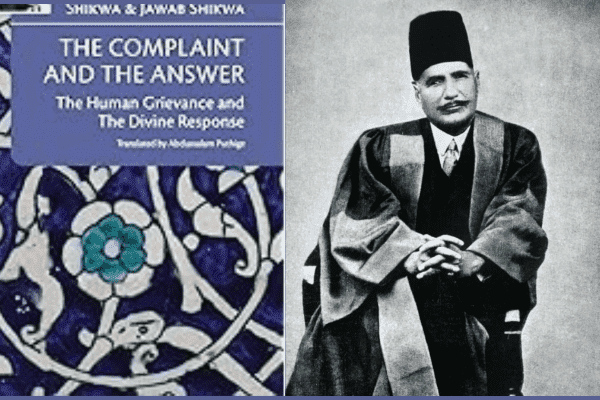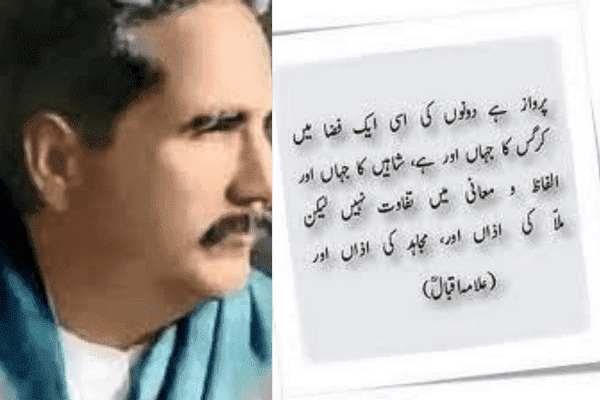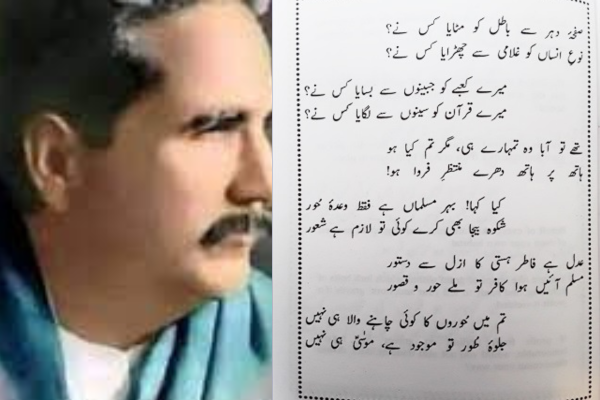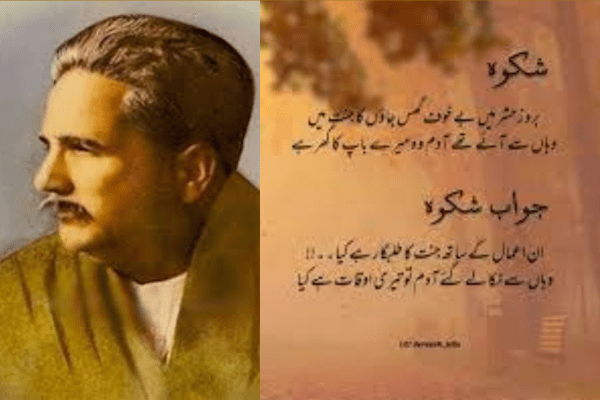Table of Contents
Introduction: The Essence of “Jawab-e-Shikwa”

One of the greatest poets and philosophers in the history of Islam, Allama Iqbal, wrote a magnificent poem titled “Jawab-e-Shikwa,” or “The Response to the Complaint.” This poem, which was written as a follow-up to his previous piece “Shikwa” (The Complaint), is an emotional and spiritual reaction to the complaints made by the Muslim community on their deteriorating situation. Through “Jawab-e-Shikwa,” Iqbal encourages Muslims to restore their lost grandeur by upholding their religion and ideals. It is a message of optimism, introspection, and divine direction.Allama Iqbal was a prominent philosopher, poet, and politician in British India, revered for his influential Urdu and Persian poetry. His work often focused on spiritual revival, self-discovery, and the intellectual empowerment of Muslims. Iqbal’s vision contributed significantly to the concept of Pakistan and its cultural identity.

Context: Understanding the Background of “Jawab-e-Shikwa”

Allama Iqbal’s 1909 work “Shikwa” caused a sensation among Muslims because of its audacious critique of their apparent disregard from Allah in spite of their past accomplishments and sacrifices. The poem expressed the feelings of a community that, in the face of internal deterioration and colonial tyranny, felt abandoned. But the 1913 work “Jawab-e-Shikwa,” which addresses these complaints and reminds Muslims of their potential and obligations, acts as a powerful response from Allah.

Key Themes in “Jawab-e-Shikwa”
Bang-e-dara: 120| Jawab-e-shikwa | The Answer To The Complaint | Allamaiqbal | Mukammalbaat

Heavenly Reaction and Responsibility
In “Jawab-e-Shikwa,” Iqbal describes how Allah addresses the grievances voiced by the Muslims. The voice from heaven clarifies that the Muslims’ demise is not the result of God abandoning them, but rather of their own mistakes and deeds. Allah encourages people to consider their current condition of division and spiritual deterioration by reminding them of their former glory and the heavenly favours they have enjoyed.
Awakening of the Islamic Soul
Iqbal highlights the necessity of a Muslim spiritual awakening. He exhorts them to get out of their sleep, reaffirm their faith, and pursue greatness. The poem emphasises that change must start inside the community and is a call to self-examination. Muslims are inspired by Iqbal’s teachings to reclaim their power, purpose, andHope and Positivity
“Jawab-e-Shikwa” is ultimately a message of hope despite the severe tone of divine rebuke. Iqbal informs Muslims that by choosing the road of justice, compassion, and righteousness, they may still restore their lost grandeur and that their fate is not predetermined. He tells them that there is no end to Allah’s kindness and that every obstacle presents a chance for development and atonement.
Literary Significance of “Jawab-e-Shikwa”

Jawab-e-Shikwa” is praised for both its excellent poetry form and its potent message. The poem, which was written in Urdu and features a beautiful fusion of Persian idioms, demonstrates Iqbal’s command of language and metaphor. The passionate poetry evokes strong feelings and introspection in readers. The poem is a timeless work that appeals to audiences all around the world because of its cadence and rhythm.
Impact of “Jawab-e-Shikwa” on Muslim Thought
The Indian subcontinent’s Muslim intellectual landscape was significantly influenced by “Jawab-e-Shikwa”. It acted as a spur for introspection and change, inspiring Muslims to put aside their complaints and strive for a better future. The poem has been read aloud at many events, ranging from spiritual meetings to political demonstrations, encouraging successive generations to adopt Iqbal’s vision of a revitalised and unified Muslim societies
Conclusion: The Enduring Legacy of “Jawab-e-Shikwa”
“Jawab-e-Shikwa” continues to be a fundamental component of Allama Iqbal’s intellectual and literary legacy. Readers are still motivated by its message of divine kindness, spiritual rebirth, and self-accountability. In addition to addressing contemporary issues, Iqbal’s poetry serves as a timeless manual for Muslims attempting to reconcile issues of faith and identity in a convoluted world.
